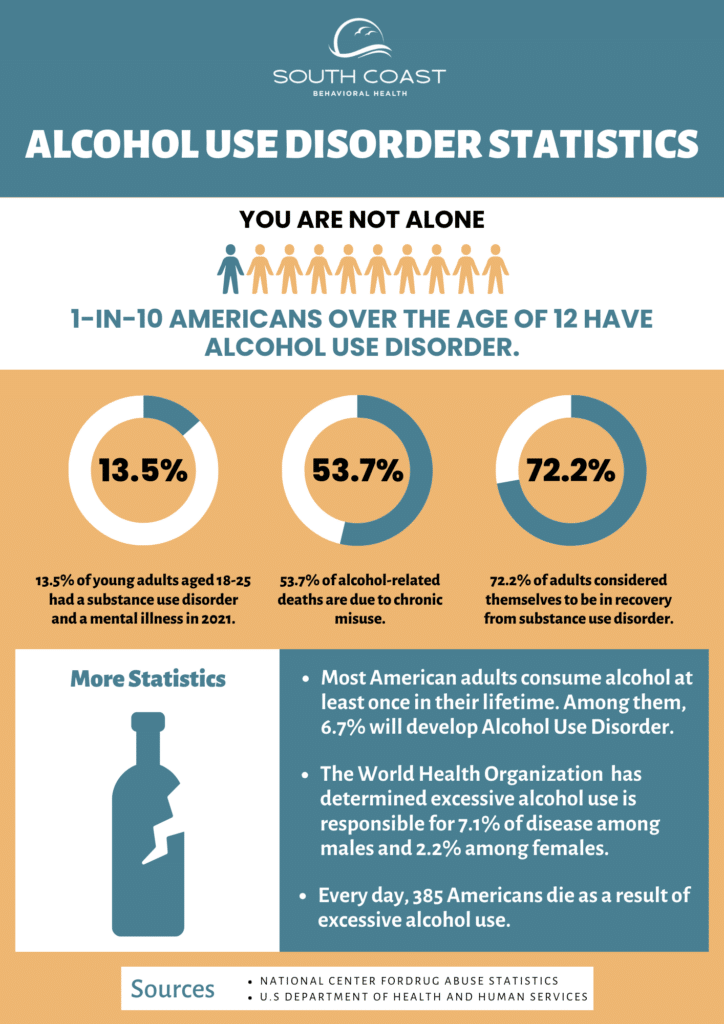Alcohol Addiction
Alcohol addiction, also known as alcohol use disorder (AUD), is a pervasive and challenging health issue that affects millions of people worldwide. It is characterized by the compulsive and uncontrolled consumption of alcohol, despite the negative consequences it has on an individual’s life. Alcohol addiction can take a severe toll on physical health, mental well-being, relationships, and overall quality of life.
Unlike those with problematic drinking levels, people with alcohol use disorder are unable to control their consumption of alcohol. For this reason, it is vital for these individuals to seek the help of licensed professionals.

What Is Alcohol Addiction?
Alcohol addiction, also known as alcohol use disorder (AUD), is a chronic and progressive condition characterized by an individual’s compulsive and problematic consumption of alcohol. It is a significant public health concern that impacts millions of people globally.
Alcohol, a legal and widely available psychoactive substance, is consumed for various reasons, including relaxation, socialization, and stress relief. However, not everyone who drinks develops AUD. The development of alcohol addiction involves a complex interplay of genetic, environmental, and psychological factors. Genetic predispositions, exposure to heavy drinking environments, and personal vulnerabilities can increase the risk of addiction.
AUD is a diagnosable condition according to the Diagnostic and Statistical Manual of Mental Disorders (DSM-5). It encompasses a range of symptoms, including increased tolerance, withdrawal symptoms, unsuccessful attempts to quit or cut down, and neglect of important social, occupational, or recreational activities due to alcohol use.
Alcohol abuse is closely related to mental health. Many individuals with AUD have co-occurring mental health disorders such as anxiety, depression, or trauma. Alcohol is often used as a form of self-medication to alleviate mental health symptoms, but it can worsen these conditions over time, creating a harmful cycle. Integrated treatment that addresses both AUD and mental health issues is essential for effective recovery and improved overall well-being.
What Are the Signs and Symptoms of Alcohol Addiction?
The signs and symptoms of alcohol addiction, also known as alcohol use disorder (AUD), can manifest in various ways, impacting an individual’s physical, mental, and social well-being. While some people believe alcohol is a stimulant due to its euphoric effects, the substance is actually a depressant. Like other depressant drugs, alcohol slows down the brain’s central nervous system (CNS), which can produce a sense of relaxation. The more someone drinks, the more apparent the depressant’s effects become.
Here are some common signs that someone may be abusing alcohol:
- Increased Tolerance: Needing more alcohol to achieve the desired effect or experiencing reduced intoxication with the same amount.
- Withdrawal Symptoms: Experiencing physical and psychological symptoms when not drinking, such as tremors, anxiety, nausea, or sweating.
- Loss of Control: Inability to limit or control alcohol intake, often drinking more than intended.
- Unsuccessful Attempts to Quit: Repeatedly trying to cut down or quit drinking but being unsuccessful.
- Neglecting Responsibilities: Prioritizing drinking over important obligations like work, school, or family.
- Cravings: Strong, uncontrollable desires for alcohol, leading to compulsive drinking.
- Interference with Daily Life: Disruption of daily activities and social interactions due to alcohol use.
- Continued Use Despite Consequences: Continued drinking despite experiencing negative consequences, such as legal problems, health issues, or relationship strain.
- Isolation: Withdrawal from social activities and hobbies in favor of alcohol use.
- Drinking in Risky Situations: Consuming alcohol in situations where it's physically hazardous, such as while driving.
Recognizing these signs early is essential for timely intervention and support. If you or someone you know exhibits these symptoms, seeking professional help is crucial for addressing alcohol addiction and working towards a healthier, alcohol-free life.
When Do You Need Alcohol Addiction Treatment?
The road to alcohol addiction often begins with casual or social drinking but can progress to problematic use and dependence. People with AUD may find it increasingly difficult to limit their alcohol intake, leading to a range of physical and psychological symptoms when they try to cut down or quit. These symptoms, combined with cravings and an escalating tolerance to alcohol, contribute to the cycle of addiction.
Drinking alcohol is widely accepted in most social circles which is why it is important to take a step back and look at your relationship with alcohol. With that said, recognizing the need for alcohol addiction treatment can be challenging, as it often involves honest introspection and acceptance of a problem.
Here are some indicators that it may be time to seek help for a drinking problem:
- Loss of Control: If you find it difficult to limit the amount of alcohol you consume, repeatedly drink more than intended, or are unable to quit despite your efforts, it may be a sign of a problem.
- Health Consequences: Alcohol abuse can lead to physical and mental health issues, such as liver disease, depression, or blackouts. When your drinking starts impacting your well-being, it's time to consider treatment.
- Neglecting Responsibilities: Prioritizing alcohol over important life obligations, such as work, family, or school, is a clear signal that your drinking is problematic.
- Relationship Strain: If your drinking is causing conflicts with loved ones, leading to broken relationships, it's time to seek help.
- Legal Problems: Legal issues like DUIs or public disturbances due to alcohol can be a strong indication that you need treatment.
- Repeated Failed Attempts to Quit: Trying to cut down or quit drinking multiple times without success is a sign of addiction.
Examples of taking drinking too far include:
- Regularly drinking to the point of intoxication.
- Drinking alone or in secrecy.
- Needing alcohol to cope with stress or emotions.
- Blacking out or experiencing memory lapses due to excessive drinking.
- Engaging in risky behaviors while intoxicated, such as driving under the influence.
If you or someone you know exhibits these signs, it’s crucial to reach out to a healthcare professional or an addiction treatment center. Early intervention can prevent further harm and facilitate the journey to recovery.
Understanding the complexities of alcohol addiction is crucial in addressing and effectively treating this condition. It involves a combination of medical, psychological, and social interventions to help individuals regain control over their lives and achieve lasting sobriety.
What Is Alcohol Addiction Treatment Like?
Alcohol addiction treatment is a comprehensive process that typically involves multiple stages, tailored to your needs, preferences, and goals in treatment. Here’s an overview of what alcohol treatment entails:

Treatment begins with a thorough assessment by a healthcare professional to determine the severity of the addiction and identify any co-occurring mental health disorders. This assessment guides the development of a personalized treatment plan.
In cases of severe alcohol dependence, medical detoxification may be necessary. This involves supervised withdrawal in a safe environment to manage withdrawal symptoms and ensure the individual’s safety.
MAT may be utilized for alcoholism treatment. Medications like naltrexone, acamprosate, or disulfiram help reduce cravings and support long-term recovery. They are often combined with therapy.
For individuals with co-occurring mental health disorders, dual diagnosis treatment is essential. It addresses both the addiction and the underlying mental health condition, often involving a combination of medication and therapy.
Various psychotherapies are used, such as Cognitive-Behavioral Therapy (CBT), Motivational Enhancement Therapy (MET), and Dialectical-Behavior Therapy (DBT). These therapies address the psychological aspects of addiction, helping individuals change unhealthy behaviors and thought patterns.
Holistic approaches, including mindfulness, yoga, nutrition counseling, and exercise, promote overall well-being and help individuals develop healthy coping mechanisms.
After completing the initial treatment program, individuals typically transition to aftercare services, which may include outpatient therapy, support groups (e.g., Alcoholics Anonymous), and ongoing medication management if needed.
Throughout the treatment process, the focus is on providing support, education, and strategies for relapse prevention. Alcohol addiction treatment aims to empower individuals to build a sober and fulfilling life, addressing physical, psychological, and emotional aspects of their recovery journey.
How Long Is Alcohol Addiction Treatment?
The duration of alcohol addiction treatment varies from person to person and depends on several factors, including the severity of addiction, individual progress, and the specific treatment plan. Typically, treatment can range from a few weeks to several months.
The recovery timeline is not limited to the duration of formal treatment. Achieving and maintaining sobriety is often a lifelong commitment. Even after completing a rehab program, individuals may continue with aftercare services, such as outpatient therapy or participation in support groups like Alcoholics Anonymous, to strengthen their sobriety.
Professional treatment centers play a crucial role in helping individuals develop relapse prevention plans. These plans include identifying triggers, creating coping strategies, and establishing a support network. The goal is to equip individuals with the tools and skills needed to navigate the challenges of daily life without turning to alcohol.
In essence, alcohol addiction treatment is a transformative journey that extends beyond rehab, requiring ongoing attention and effort. It’s a commitment to a healthier, sober life that can be achieved and sustained with the right support and resources.
Alcohol Addiction Treatment at South Coast Behavioral Health
South Coast Behavioral Health is dedicated to providing comprehensive and individualized alcohol addiction treatment with a holistic approach. Our treatment philosophy is rooted in evidence-based practices, compassionate care, and a commitment to addressing the physical, psychological, and emotional aspects of AUD and addiction. Here’s an overview of our approach and the levels of care and treatment options we offer:
- Personalized Care: We recognize that every individual is unique, so we tailor treatment plans to meet specific needs and circumstances.
- Holistic Approach: Our programs incorporate holistic modalities, including mindfulness, nutrition counseling, exercise, and yoga, to promote overall well-being.
- Evidence-Based Therapies: We utilize evidence-based therapies such as Cognitive-Behavioral Therapy (CBT), Problem-Solving Therapy (PST), and Dialectical-Behavior Therapy (DBT) to address the psychological aspects of addiction.
- Dual Diagnosis: We provide specialized treatment for individuals with co-occurring mental health disorders, addressing both addiction and underlying conditions.
Levels of Care and Treatment Options at SCBH
South Coast Behavioral Health offers a continuum of care within our treatment programs to individuals suffering from substance use and co-occurring disorders. Throughout Orange County, California, South Coast provides tailored treatment services to assist individuals in healing from addictions to drugs and alcohol through our comprehensive treatment programs. Our levels of care include:
- Medical Detox Program: We offer medically supervised detox to safely manage withdrawal symptoms.
- Residential Treatment Program: Our 24/7 residential program provides intensive therapy and support in a structured environment.
- Partial Hospitalization Program (PHP): PHP offers structured daytime programming with the option to return home at night.
- Intensive Outpatient Program (IOP): IOP allows flexibility for individuals to maintain daily life while participating in intensive therapy.
Get A Confidential Assessment From A Recovery Specialist
Addiction Treatment in Orange County, CA
At South Coast Behavioral Health, our commitment is to help individuals struggling with alcohol addiction achieve lasting sobriety and improved overall well-being. We provide the tools, support, and guidance needed to navigate the journey to recovery successfully.
We provide alcohol addiction treatment for men within our medical detox and residential treatment centers in Irvine, CA.
We offer alcohol addiction treatment for women at our medical detox and residential treatment centers in Huntington Beach, CA.
We provide alcohol addiction treatment for men within our residential inpatient facility in Costa Mesa, CA.
We provide alcohol addiction treatment during our PHP and IOP programs in Newport Beach, CA.
If you or a loved one is in need of treatment for AUD or alcohol addiction, SCBH offers a variety of treatment options suited to your individual needs. Contact us today to start the road to recovery.



